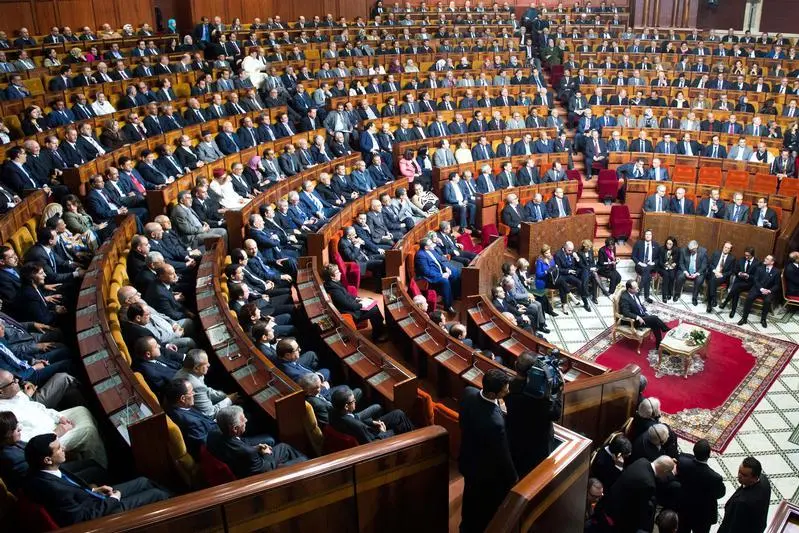PHOTO
(Adds details and background)
RABAT, July 20 (Reuters) - Morocco's parliament on Wednesday gave final approval to a pensions reform bill, members of the house said, despite labour unions saying the new law will damage workers rights and vowing to block it.
It is the latest major structural reform passed by the Islamist-led government that came to power after early elections in 2011, held to calm down the Arab spring-like protests. The Moroccan monarchy mixed institutional reforms, heavy spending and tough security to stifle the wave in 2011.
The government has been repairing public finances since, introducing subsidy cuts, tax reforms and freezing public sector hiring. This has drawn praise from international lenders and protests from labour unions.
The changes to state pension funds include an increase in the retirement age to 63 from 60 by 2022, and higher workers and state contributions.
Abdellah Bouanou, a lawmaker from the Justice and Development party (PJD) leading the government, said the bill had passed by 70 votes to 35.
The bill was voted in the upper house last month.
However, Morocco's four largest labour unions said they would escalate their protest, having blocked it for months in the upper house where they control a sixth of the seats.
Dozens of acivists held a sit-in outside the parliament while the lawmakers were voting, a Reuters photographer said.
Abdelhak Hessan, a member of the upper house from the Democratic Labour Confederation (CDT), said his union has started legal action against the government.
"We have contacted our lawyers because we are taking it to the Constitutional court, the government has broken many laws to pass the bill," said Abdelhak Hessan, a member of the upper house from the Democratic Labour Confederation (CDT).
Hessan said the CDT, which boycotted the vote, has also started talks with other unions to decide on the other steps to take against the reform.
Morocco is expected to hold parliamentary elections next October.
The government said earlier the reform will cost 41 billion dirhams ($4.1 billion) over the next five years, and any delay will add more to the burden.
(Reporting By Aziz El Yaakoubi; Editing by Hugh Lawson) ((aziz.elyaakoubi@thomsonreuters.com; +212623934595)(;))
RABAT, July 20 (Reuters) - Morocco's parliament on Wednesday gave final approval to a pensions reform bill, members of the house said, despite labour unions saying the new law will damage workers rights and vowing to block it.
It is the latest major structural reform passed by the Islamist-led government that came to power after early elections in 2011, held to calm down the Arab spring-like protests. The Moroccan monarchy mixed institutional reforms, heavy spending and tough security to stifle the wave in 2011.
The government has been repairing public finances since, introducing subsidy cuts, tax reforms and freezing public sector hiring. This has drawn praise from international lenders and protests from labour unions.
The changes to state pension funds include an increase in the retirement age to 63 from 60 by 2022, and higher workers and state contributions.
Abdellah Bouanou, a lawmaker from the Justice and Development party (PJD) leading the government, said the bill had passed by 70 votes to 35.
The bill was voted in the upper house last month.
However, Morocco's four largest labour unions said they would escalate their protest, having blocked it for months in the upper house where they control a sixth of the seats.
Dozens of acivists held a sit-in outside the parliament while the lawmakers were voting, a Reuters photographer said.
Abdelhak Hessan, a member of the upper house from the Democratic Labour Confederation (CDT), said his union has started legal action against the government.
"We have contacted our lawyers because we are taking it to the Constitutional court, the government has broken many laws to pass the bill," said Abdelhak Hessan, a member of the upper house from the Democratic Labour Confederation (CDT).
Hessan said the CDT, which boycotted the vote, has also started talks with other unions to decide on the other steps to take against the reform.
Morocco is expected to hold parliamentary elections next October.
The government said earlier the reform will cost 41 billion dirhams ($4.1 billion) over the next five years, and any delay will add more to the burden.
(Reporting By Aziz El Yaakoubi; Editing by Hugh Lawson) ((aziz.elyaakoubi@thomsonreuters.com; +212623934595)(;))





















